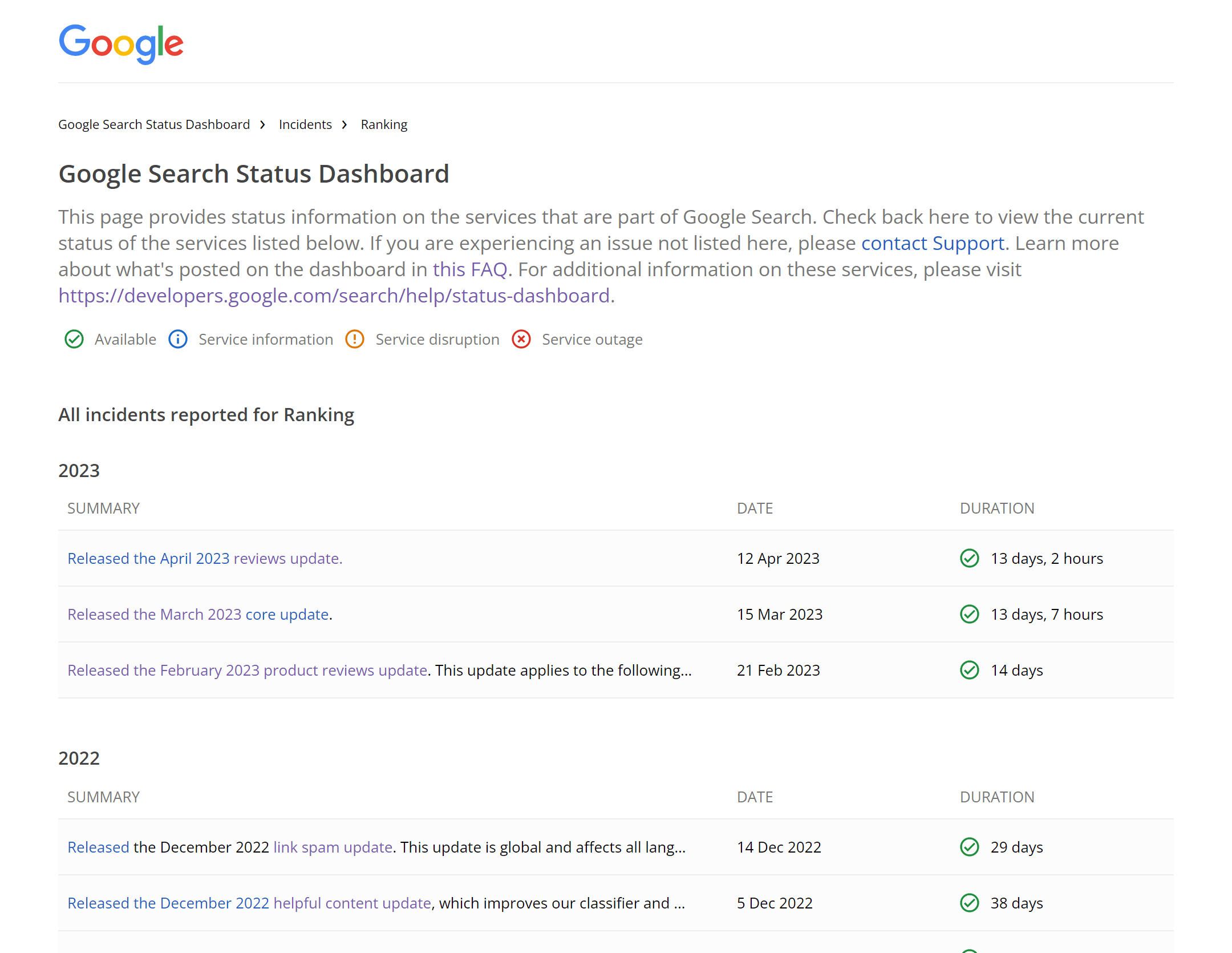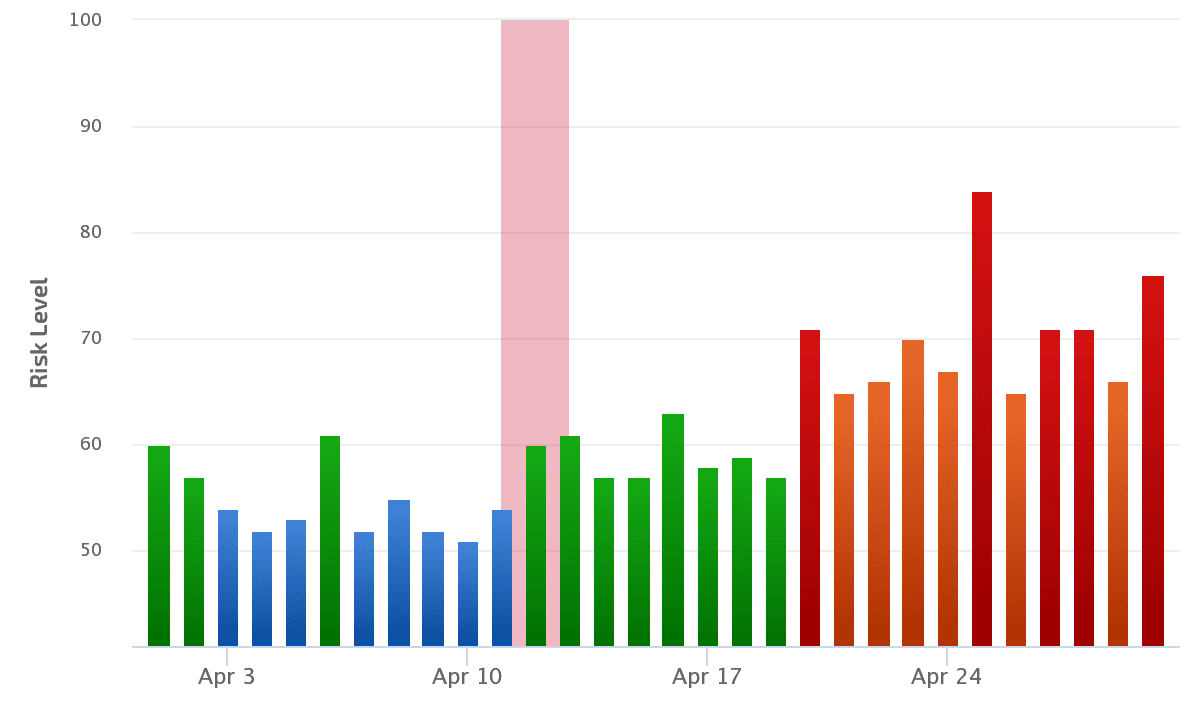Up until 2020, Google liked to spring an April fool’s joke on SEOs for April 1st, including the famous PigeonRank documentation from 2002 that revealed that pecks from trained pigeons were used as a ranking factor. Unfortunately, Google lost its sense of humor during the COVID pandemic and, as a result, Google News in April is now a much more serious business. Among news this month you should be aware of a major update, unamusingly called “The April 2023 Reviews Update” and some news about changes to the Page Experience documentation that led many people to understand that page experience, including page speed and Core Web Vitals, were no longer ranking factors. Then again, maybe this was Google’s April Fool’s joke?

April 12th – April 2023 Reviews Update
A new update to Google’s ranking systems was announced on April 12th via the @googlesearchc Twitter account and on the Google Search Status Dashboard.
The Reviews Update marks an expansion to the Product Reviews system which has had numerous updates over the past months (the last one in March 2023). As well as product reviews, the Reviews System is now applied to content written about services, destinations, games, movies and other topics. It applies to content written in English, Spanish, German, French, Italian, Vietnamese, Indonesian, Russian, Dutch, Portuguese and Polish.
The tweet published by Google Search Central links to the article Write high quality reviews, whereas the Google Search Status Dashboard links to the new Reviews System page which is also linked from the official guide to Google Search Ranking Systems documentation.
Google’s advice on writing high quality reviews gives a list of best practices to follow that we will repeat here:
- Evaluate from a user’s perspective.
- Demonstrate that you are knowledgeable about what you are reviewing—show you are an expert.
- Provide evidence such as visuals, audio, or other links of your own experience with what you are reviewing, to support your expertise and reinforce the authenticity of your review.
- Share quantitative measurements about how something measures up in various categories of performance.
- Explain what sets something apart from its competitors.
- Cover comparable things to consider, or explain which might be best for certain uses or circumstances.
- Discuss the benefits and drawbacks of something, based on your own original research.
- Describe how a product has evolved from previous models or releases to provide improvements, address issues, or otherwise help users in making a purchase decision.
- Focus on the most important decision-making factors, based on your experience or expertise (for example, a car review might determine that fuel economy and safety are key decision-making factors and rate performance in those areas).
- Describe key choices in how a product has been designed and their effect on the users beyond what the manufacturer says.
- Include links to other useful resources (your own or from other sites) to help a reader make a decision.
- Consider including links to multiple sellers to give the reader the option to purchase from their merchant of choice.
- When recommending something as the best overall or the best for a certain purpose, include why you consider it the best, with first-hand supporting evidence.
- Ensure there is enough useful content in your ranked lists for them to stand on their own, even if you choose to write separate in-depth single reviews.
The article also refers affiliates to “Google’s position on affiliate programs” which is in fact a link to the “Thin affiliate pages” section of their anti-spam guidelines. This warns affiliates against simply cutting and pasting content from merchant sites without adding any original content or additional value.
There was little volatility in ranking on Google in the days after the release of the Reviews Update on April 12th. Then an important level of volatility appeared on tools like the RankRanger Risk Index from April 20th (see chart below). Volatility is still being reported at the time of writing even though the update finished rolling out on April 25th, according to Google. We assume that ongoing volatility is still part of the update. If you have suffered a loss of ranking since April 20th, you should look at the recommendations from Google above.
 RankRanger Risk Index</a> for April 2023" width="1200" height="720" srcset="https://www.seopress.org/wp-content/uploads/2023/05/02-rankranger-risk-index-for-april-2023.png 1200w, https://www.seopress.org/wp-content/uploads/2023/05/02-rankranger-risk-index-for-april-2023-768x461.png 768w" sizes="(max-width: 1200px) 100vw, 1200px" />
RankRanger Risk Index</a> for April 2023" width="1200" height="720" srcset="https://www.seopress.org/wp-content/uploads/2023/05/02-rankranger-risk-index-for-april-2023.png 1200w, https://www.seopress.org/wp-content/uploads/2023/05/02-rankranger-risk-index-for-april-2023-768x461.png 768w" sizes="(max-width: 1200px) 100vw, 1200px" />Video previews in search results
On April 13th, Google made a small change to its search engine results pages (also known by the acronym “SERPs”) impacting pages that have videos. The change announced via an article on Google Search Central means that only pages where a video is the main content will now obtain a video thumbnail in search results.
Previously, pages may have obtained a video thumbnail even though the video was not the main content of the page. Indeed, some pages seemed to be getting thumbnails by using Video Schema markup alone – with no actual video on the page at all.
Warnings on this subject have been sent to website owners by Google Search Console over the past few months indicating that Google could not find video in the main content of the page.

Confusion over Page Experience signals
On April 19th Google updated and reorganized its documentation on Page Experience, adding a section to Helpful Content about page experience.
In The role of page experience in creating helpful content, Google announced that they will be retiring Page Experience reports in Google Search Console at the end of the year. On April 21st, Barry Schwartz also reported Google Drops Mobile-Friendly, Page Speed, Secure Sites & Page Experience As Retired Ranking Systems. Like many, Barry wondered whether this meant that Page Speed, Mobile-Friendliness and indeed Page Experience (including Core Web Vitals) were no longer considered as ranking factors by Google. The fact that they were removed from the list of ranking systems and not included in the list of retired systems could also mean that these had never been ranking factors at all.
It took a long tweet by Danny Sullivan a week later to clarify things. Page Experience is still very much a ranking factor, but it is not a standalone “ranking system” and never was, despite the fact that it had been listed as one in the Ranking Systems documentation.
Our guidance on page experience is here, as we shared last week along with our blog post:https://t.co/My7bdcBhwS
It does *not* say page experience is somehow "retired" or that people should ignore things like Core Web Vitals or being mobile-friendly. The opposite. It says if… pic.twitter.com/KkjRklCmnH
— Google SearchLiaison (@searchliaison) April 28, 2023
The April 19th article “The role of page experience in creating helpful content” is actually very clear on this and contains the note “We haven’t introduced any major new aspects of page experience to consider versus our previous guidance. If you’ve been paying attention to things we’ve talked about in the past, such as Core Web Vitals, all that remains as before.”
The article also goes on to give advice on good page experience, saying that if you answer “Yes” to the following questions then you are probably on track to improve rankings in Google:
- Do pages have good Core Web Vitals?
- Are pages served in a secure fashion?
- Does content display well for mobile devices when viewed on them?
- Does the content lack an excessive amount of ads that distract from or interfere with the main content?
- Do pages lack intrusive interstitials?
- Can visitors easily navigate to and locate the main content of your pages?
- Is the page designed so visitors can easily distinguish the main content from other content on your page
A new Understanding Core Web Vitals page by Google also gives some pointers on how to optimize sites. Also check out our advice on Core Web Vitals and WordPress SEO published on April 1, 2021 (no joke).
Google Search News Video
Finally, John Mueller was alone and at home again for the latest installment of the Google Search News series. Although it is named the Google Search News April, it is mainly news from January to March. Even so, you may find it a useful and entertaining watch.



